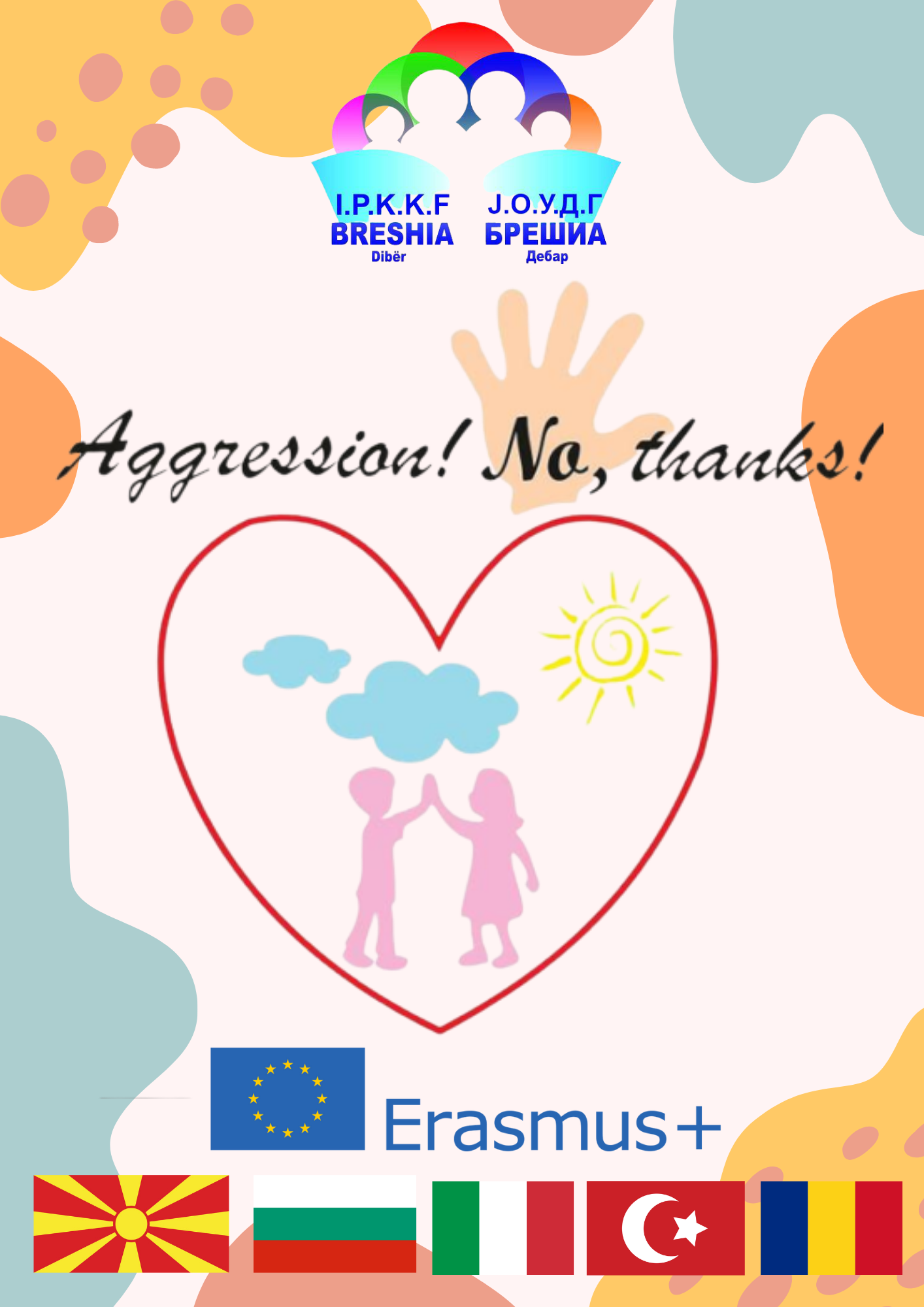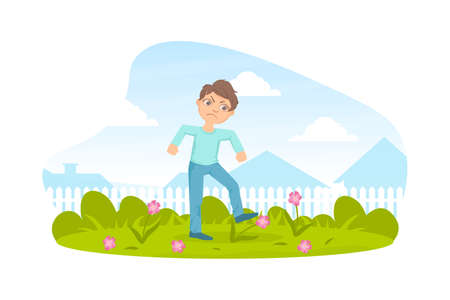AGGRESSION! NO, THANKS!
Aggression is the body's natural response to challenges which interfere with the children's ’s ability to learn, memorize and which can also lead to poor physical and mental health.
Aggression! No, thanks!


5 Participating countries: Bulgaria, North Macedonia, Turkey, Romania. Italy
Start: 01-11-2021 - End: 01-11-2022
Project Reference: 2021-1-BG01-KA220-SCH-000024537
EU Grant: 142.300 EUR
Programme: Erasmus+
Key Action: SCH - Cooperation partnerships in school education
Aggression, and the cluster of negative behaviours (such as oppositional behaviour, destructive behaviour) that typically accompanies it, is among the most serious and prevalent problems. Indeed, aggression is often the primary characteristic of both oppositional defiant disorder and conduct disorder. Many of the costliest and damaging societal problems have their origins in early conduct problems. These problems, particularly when they emerge in early childhood, are extremely stable and predictive of poor outcomes. Indeed, half of the children identified with behaviour problems in preschool continue to exhibit the behaviour pattern throughout childhood and into early adolescence. There is also an absolute need for teachers who are well-improved and competent in terms of both vocational and basic skills. These are mostly common needs of knowledge about early prevention. It is important to note that preventive interventions, particularly those focused on enhancing children’s cognitive skills, will also reduce child aggression. This project will gain highlights the inter connectedness of systems during the preschool period and will help to all participants exchange different and valuable experience. Erasmus+ will help participants at all stages of their lives, from kindergarten to school, to pursue stimulating opportunities for learning across Europe, both inside and outside of the classroom. We will gain valuable life-skills and international experience to help us develop personally, professionally, and academically. The staff will increase its skills and competences. We'll get to know first-hand the workings of another European education system, learn, and share innovative ideas and explore best practices. We'll be inspired by new colleagues and refresh our thinking. Improvement to the quality of teaching and learning across institution or organization following a staff mobility, partnership will enhance its reputation and its international standing. Aggression is the body's natural response to challenges which interfere with the children's ’s ability to learn, memorize, and earn good grades and which can also lead to poor physical, emotional, and mental health. Younge children, like adults, may experience stress every day and when they perceive a situation as dangerous and painful, they don’t have the resources to cope. That key fact that made us to do something for these students by starting an Erasmus Project with schools which face the same problem in Europe. We conducted a survey to carry out the number of t students with aggressive behaviour and started to gather information in order to deal with aggression and aggressors more professionally. And, according to the results, we noticed that the problem we intend to work on is too difficult and complex and we decided to face this challenge and to realize a project that will combine different countries. While working on the topic we noticed that we would need licensed teachers to provide training for coping with aggression. Luckily partner schools have those teachers and Psychologist who will contribute by giving presentations, workshops, and seminars, conducting surveys and even teaching meditation techniques and other emotion and problem-solving aggression management techniques to the applicants. In Aggression! No, thanks! project, partner schools from Romania, Turkey, Bulgaria, Italy, and Macedonia will combine their efforts to help their students to cope with about aggression: what it is, what causes it, what are the possible consequences and, above all, in which ways they can cope with it. Throughout the project, each partner school will contribute, in its own way, to spread knowledge about the problem and to offer, if not solutions, remedies that pupils will experiment and hopefully adopt in their everyday life.

We want to have a Solid Plan and Methodology for prevention of aggression which will be used not only for our partnership but outside it too. To create Sufficient Resources which be acceptable and beneficial for kindergarten and primary schools. We want to create a classroom that is organized and that is characterized by mutual respect makes it a lot easier to teach effectively, and one of the most important things teachers can do to promote learning is to create classroom environments where students feel safe. We want to use interactive approaches such as small groups and cooperative learning, it’s especially important to create a classroom where students feel safe asking questions and contributing to discussions. It is also important to think about the environment of the school, beyond the classroom. When students stand in the hallway or school or kindergarten yard is important to comunicate free and calmly. Some schools feel like prisons, where students may not even be allowed to talk, and students may seem overly compliant. Other schools can be totally out of control. Both extremes are likely to take something away from the learning experience. Working together with other teachers and administrators we want to encourage positive interaction among students. We want organisations to have identified models of good practices in the contact, support and help of aggressive behaviour and this information to be disseminated within each partner organisation, other organisations workingwith the same or similar target groups in the partner organisation's country. Partner organisations to identify models of good practices in the monitoring and evaluation of training learning by doing programme; this information will be disseminated within each partner organisation, other organisations delivering education to the same or similar communities in each country and the wider lifelong learning community across Europe. Improvements in the delivery of training to our learners (ie: our trainers) by our staff .We expect to gaining, at the end of the project, the opportunity to show and share the results and the guidelines elaborated with regional, national and european institutions to discuss and propose new politics and new intervention strategy on the prevention of aggression in early age.
The results expected during the project and on its completion are:
-To make children understand that they behave aggressively and encourage them to get help from their teachers and parents when needed.
- To teach children the signs of aggression
- To help children stop the aggression. Eventually, they can be happier, healthier, and more productive;
- To train children on how to cope with aggression (on that point, licensed teachers and psychologist).
- Relaxation, emotion, and problem-solving aggression management techniques.
- To train parents to work out with their children what is causing the stress and help them learn to manage it. Because spending time with children, taking part in school activities, learning to listen, being a role model helps them reduce stress
- To make them trust themselves with effective aggression management which will increase their academic success.
- Promoting the European dimension in education. -Increasing the education quality at schools by reducing stress among teenagers.
Target Project results:
Presentations and workshops on aggression, aggression symptoms, aggression types, coping With aggression (different techniques held by educated teachers,psychologist) Seminars related to stress for a group of teachers and parents.
- Elaboration of profiles of aggressors.
- Positive discipline
- Identification of common as well as specific difficulties in the work with aggressive children
- Analysis and explicitation of the factors/causes of the aggressive behaviour;
- Sharing of practices and methodologies;
- Presentation of alternative and innovative interventions, with more probability of success.
- A publication out of the reflexive work on the profiles and their discussion in the workshops that will try to establish guidelines for good practice
-.Elaboration of a training curriculum to better prepare professionals to understand and intervene with this population
- The building of tools like a training book and DVD that can be used in the training of other professionals
Organisation of International meetings will be a chance for sharing experiences between partners, discuss opportunities and solve problems. The whole school communities will take part, at different levels, in the project: students, families, teachers, principals, and the local communities as well, will be informed of the activities and the results. The project will also offer the opportunity of discovering, developing and using new teaching methods, by learning more about other educational techniques and school systems, attending classes in all participant countries and exchanging good practices. All the activities and final products will be recorded in a final electronic device and implemented on the Etwinning platform

Materials:
*
*
*
You can follow our work here:
* eTwinning Space - HERE!
* Web site of the project -
* Facebook page - HERE!
© Copyright 2020 by Breshia In Debar - North Macedonia
Design & CMS: Ozki
ПОЛИТИКА НА ПРИВАТНОСТ
КОРИСТИМЕ КОЛАЧИЊА *COOKIES НА ОВАА ВЕБ-СТРАНА ЗА ПОДОБРУВАЊЕ НА ВАШЕТО КОРИСНИЧКО ИСКУСТВО.

 Breshia eTwinning
Breshia eTwinning